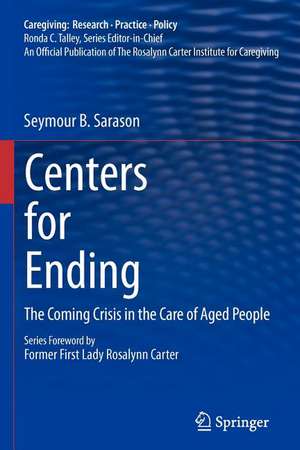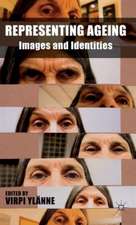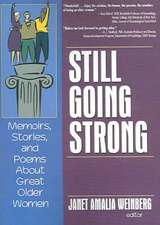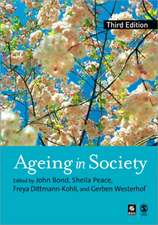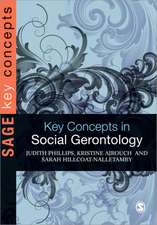Centers for Ending: The Coming Crisis in the Care of Aged People: Caregiving: Research • Practice • Policy
Autor Seymour B. Sarasonen Limba Engleză Paperback – 4 aug 2011
In Centers for Ending, Dr. Sarason uses his firsthand experience as both practitioner and patient in senior facilities to reveal wide-ranging professional and moral issues affecting this seemingly familiar terrain. Insensitive medical personnel, poorly trained nurses and aides, indifferent administrators, and a prevailing culture content with treating “bodies” instead of human beings are identified as contributing factors. Drawing on America’s rich history of large-scale solutions to social problems, Dr. Sarason offers penetrating insights and bold suggestions in such areas as:
- The widening care gap between haves and have-nots.
- Why professional caregivers fail to understand patients.
- The nursing home resident as immigrant.
- Why previous reform efforts have not worked.
- The need for a Presidential commission for the elderly.
- The scenario if conditions are allowed to remain as they are or worsen.
Preț: 327.87 lei
Preț vechi: 345.12 lei
-5% Nou
Puncte Express: 492
Preț estimativ în valută:
62.74€ • 65.50$ • 51.92£
62.74€ • 65.50$ • 51.92£
Carte tipărită la comandă
Livrare economică 04-18 aprilie
Preluare comenzi: 021 569.72.76
Specificații
ISBN-13: 9781441957245
ISBN-10: 1441957243
Pagini: 124
Ilustrații: XI, 109 p.
Dimensiuni: 155 x 235 x 10 mm
Greutate: 0.19 kg
Ediția:2011
Editura: Springer
Colecția Springer
Seria Caregiving: Research • Practice • Policy
Locul publicării:New York, NY, United States
ISBN-10: 1441957243
Pagini: 124
Ilustrații: XI, 109 p.
Dimensiuni: 155 x 235 x 10 mm
Greutate: 0.19 kg
Ediția:2011
Editura: Springer
Colecția Springer
Seria Caregiving: Research • Practice • Policy
Locul publicării:New York, NY, United States
Public țintă
Professional/practitionerCuprins
Series Foreword by Rosalynn Carter.- Foreword by Saul B. Cohen.- Themes of the Book.- Becoming a Resident in a Total Care Facility.- Residents as Immigrants.- Some Aspects of Organizational Craziness.- Two Months in the Nursing Home.- Planning Programs: Social Security and Head Start.- The Haves and the Have Nots.- The Need for a Presidential Commission: Some Caveats.- On the Uses of History.- Epilogue.- References.- About the Author.
Recenzii
From the reviews:
“Written as an educational tool for families and/or caregivers who are providing care for an elderly person, this book would be a great reference for nursing homes to teach caregivers how it feels to be dependent on others. It also provides insights into regulatory changes needed to improve elders’ psychosocial satisfaction and autonomy when dependent upon others. … The author is an expert in the psychosocial needs of people … . The author’s real life experiences lend considerable weight to the book.” (Katherine L. Aguilar, Doody’s Review Service, October, 2011)
“Written as an educational tool for families and/or caregivers who are providing care for an elderly person, this book would be a great reference for nursing homes to teach caregivers how it feels to be dependent on others. It also provides insights into regulatory changes needed to improve elders’ psychosocial satisfaction and autonomy when dependent upon others. … The author is an expert in the psychosocial needs of people … . The author’s real life experiences lend considerable weight to the book.” (Katherine L. Aguilar, Doody’s Review Service, October, 2011)
Notă biografică
Since retiring in 1989 after 45 years as a member of the Yale faculty, Seymour B. Sarason has continued to pursue his many professional interests. Since the year 2000, he has written eight books and has delivered scores of invited and keynote lectures. His work is provides seminal contributions to varied fields including developmental disabilities, clinical and community psychology, ecological and prevention sciences, teacher education, school improvement, and educational reform. His nearly 50 books have been widely read, extensively cited, and provided the conceptual foundation for significant research and program innovation across many disciplines.
Ever curious and reflective, Dr. Sarason uses his own experiences as a resident and patient in an extended care nursing facility to examine staffing, setting, and public health planning issues related to the impending surge in the nation’s elderly population. In the process, he brings to light the extent to which the elderly become depersonalized, objectified and the victims, in many cases, of self-fulfilling prophecies concerning their physical, cognitive, and emotional capacities. This volume builds on Dr. Sarason’s lifelong commitment to bringing underlying assumptions and their resulting practices into the light to gain awareness and thereby improvement in systems responsible for the care and nurturance of those in need.
Ever curious and reflective, Dr. Sarason uses his own experiences as a resident and patient in an extended care nursing facility to examine staffing, setting, and public health planning issues related to the impending surge in the nation’s elderly population. In the process, he brings to light the extent to which the elderly become depersonalized, objectified and the victims, in many cases, of self-fulfilling prophecies concerning their physical, cognitive, and emotional capacities. This volume builds on Dr. Sarason’s lifelong commitment to bringing underlying assumptions and their resulting practices into the light to gain awareness and thereby improvement in systems responsible for the care and nurturance of those in need.
Textul de pe ultima copertă
As people live longer and health care costs continue to rise and fewer doctors choose to specialize in geriatrics, how prepared is the United States to care for its sick and elderly? According to veteran psychologist Seymour Sarason’s eloquent and compelling new book, the answer is: inadequately at best. And rarely discussed among the grim statistics is the psychosocial price paid by nursing home patients, from loneliness and isolation to depression and dependency.
In Centers for Ending, Dr. Sarason uses his firsthand experience as both practitioner and patient in senior facilities to reveal wide-ranging professional and moral issues affecting this seemingly familiar terrain. Insensitive medical personnel, poorly trained nurses and aides, indifferent administrators, and a prevailing culture content with treating “bodies” instead of human beings are identified as contributing factors. Drawing on America’s rich history of large-scale solutions to social problems, Dr. Sarason offers penetrating insights and bold suggestions in such areas as:
In Centers for Ending, Dr. Sarason uses his firsthand experience as both practitioner and patient in senior facilities to reveal wide-ranging professional and moral issues affecting this seemingly familiar terrain. Insensitive medical personnel, poorly trained nurses and aides, indifferent administrators, and a prevailing culture content with treating “bodies” instead of human beings are identified as contributing factors. Drawing on America’s rich history of large-scale solutions to social problems, Dr. Sarason offers penetrating insights and bold suggestions in such areas as:
- The widening care gap between haves and have-nots.
- Why professional caregivers fail to understand patients.
- The nursing home resident as immigrant.
- Why previous reform efforts have not worked.
- The need for a Presidential commission for the elderly.
- The scenario if conditions are allowed to remain as they are or worsen.
Caracteristici
Offers a critical review and analysis of elder care policies and practices in the United States Provides first-person insights into the experience of living in a long-term nursing care facility Humanizes issues surrounding elder care to ensure that individuals and their caregivers, both professional and family, are able to understand key concepts Examines challenges the nation must confront with the impending surge in the demand for end-of-life care facilities Includes supplementary material: sn.pub/extras
